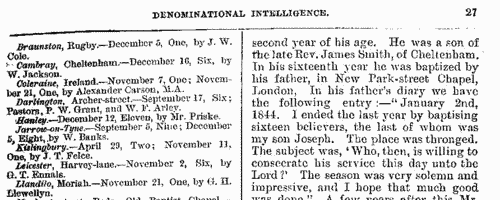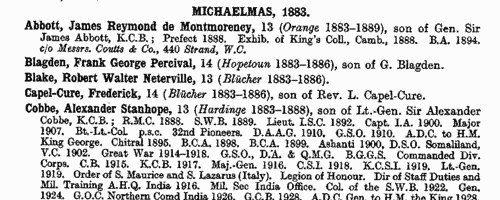Our indexes include entries for the spelling briggs. In the period you have requested, we have the following 1,666 records (displaying 1,131 to 1,140):
Inhabitants of Redditch in Worcestershire
(1868)
Gentry, farmers and traders listed in J. E. R. Kelly's Post Office Directory of Worcestershire. (The sample scan is of the section for the little parish of Hadzor) | Sample scan, click to enlarge

|
Patentees of New Inventions
(1868)
Abstracts of British patents for new inventions applied for and granted from 1 January to 31 December 1868: giving date, name and address, and short description of the invention. It is then stated whether 'Letters patent sealed' or 'Provisional protection only'. | Sample scan, click to enlarge

|
Stockton-on-Tees Voters: Stockton Polling District
(1868)
This poll book for the First Parliamentary Election for the Borough of Stockton-on-Tees lists the voters alphabetically by polling district, with full name (surname first) and address. In the right-hand column D represents the Liberal candidate, Joseph Dodds, Esq., and V the Conservative, Lord Ernest Vane Tempest. The three polling districts were Norton, Stockton (including so much of Linthorpe as lay within the parliamentary borough of Stockton), and Thurnaby. At the end of each district the handful of lodger voters are listed separately. | Sample scan, click to enlarge

|
Patentees of New Inventions
(1869)
Index of patentees and applicants for patents of inventions in 1869: giving full name of patentee (surname first); number of patent (in bold); date (within 1869); and subject-matter. Where the patentee was acting as agent for third parties, their names are given in italics in the subject-matter column. | Sample scan, click to enlarge

|
Science Schools and Classes: Elementary Examination: Class Lists
(1869)
The Science and Art Department of the Committee of Council on Education published these class lists giving the names of all the successful candidates in the examination of science schools and classes taken in May 1869. The candidates were of three levels: honours; second stage or advanced examination; third stage or elementary examination. Twenty-three subjects were offered. These are the lists for the elementary examination. The tables, arranged subject by subject, give the candidate's full name (surname first), age, and occupation - or, in the case of those not yet of working age, father's occupation, preceded by (f.). Many candidates sat and were successful in more than one subject, and so appear in more than one list. The subjects are: I. Practical, Plane and Solid Geometry; II. Machine Construction; III. Building Construction; IV. Elementary Mathematics; V. Higher Mathematics; VI. Theoretical Mechanics; VII. Applied Mechanics; VIII. Acoustics, Light, and Heat: IX. Magnetism and Electricity; X. Inorganic Chemistry; XI. Organic Chemistry; XII. Geology; XIII. Mineralogy; XIV. Animal Physiology; XV. Zoology; XVI. Vegetable Anatomy and Physiology; XVII. Systematic and Economic Botany; XVIII. Mining; XIX. Metallurgy; XX. Navigation; XXI. Nautical Astronomy; XXII. Steam; XXIII. Physical Geography. | Sample scan, click to enlarge

|
 Artillerymen who fought in the New Zealand War
(1861-1870) Artillerymen who fought in the New Zealand War
(1861-1870)
New Zealand War Medal roll for the Royal Artillery: for service in the New Zealand campaign 1861 to 1866: the rolls were compiled following a general order in 1869 and the medals were distributed in 1870. | Sample scan, click to enlarge

|
 Men of the 3rd Waikato Regiment who served in the New Zealand War
(1861-1870) Men of the 3rd Waikato Regiment who served in the New Zealand War
(1861-1870)
New Zealand War Medal roll for members of the 3rd Waikato Regiment who volunteered for service in the Imperial Commissariat Transport Corps in the New Zealand campaign 1861 to 1866: the rolls were compiled following a general order in 1869 and the medals were distributed in 1870. | Sample scan, click to enlarge

|
 Men of the Royal Irish regiment who fought in the New Zealand War
(1863-1870) Men of the Royal Irish regiment who fought in the New Zealand War
(1863-1870)
New Zealand War Medal roll for the 2nd battalion, the 18th (Royal Irish) Regiment of Foot: for service in the New Zealand campaign 1863 to 1867: the rolls were compiled following a general order in 1869 and the medals were distributed in 1870. | Sample scan, click to enlarge

|
Baptists
(1870)
The Baptist Messenger was produced monthly. The material indexed is mainly the Denominational Intelligence, i. e. the doings of the Baptist churches in Britain and Ireland, including summary lists of baptisms naming only the ministers. There are also some Baptist obituaries, and lists of donations to the Pastors' College at the Metropolitan Tabernacle in London. | Sample scan, click to enlarge

|
Boys entering Wellington College in Berkshire
(1870)
Wellington College, near Wokingham, was originally founded for the education of sons of military officers. A register of boys entering the school from First Term 1859 to Michaelmas 1933 was compiled by F. G. Lawrence for the Old Wellingtonian Society. In each entry the boy's name is given in full, in bold, surname first; age at entry (usually 11 to 14); then, in brackets, the name of the dormitory or house to which he belonged, in italics, with the years of his stay; then his father's name (usually surname and initials, but not christian name) with military decorations where appropriate. School prefects and captains are noted as such; if the boy played cricket for the school, XI with the years; academic honours, scholarships, &c.; a brief biography; and date of death, or (where known) address in 1933. Year of marriage is given, and sometimes the wife's name and/or her father's name. Clearly, those boys who kept contact with the school and/or had distinguished military careers have detailed entries; others disappeared into oblivion on leaving. | Sample scan, click to enlarge

|
Research your ancestry, family history, genealogy and one-name study by direct access to original records and archives indexed by surname.












